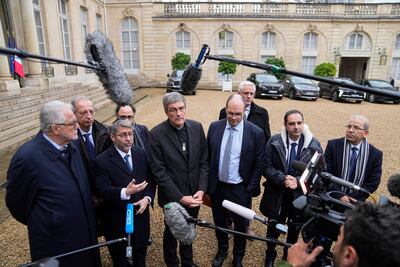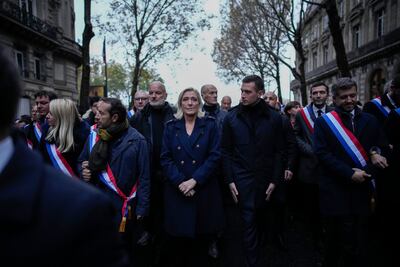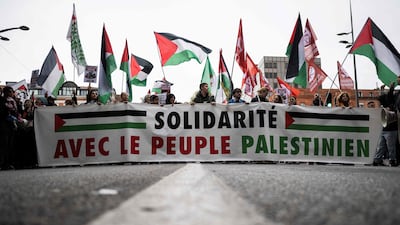David, a 33-year-old PhD student, has been to all the pro-Palestine demonstrations organised in France since October 7, feeling an urgent need to highlight the suffering of those besieged by Israel in the war in Gaza.
But when Senate and National Assembly presidents Gerard Larcher and Yael Braun-Pivet last week called for a march against anti-Semitism following a surge in anti-Jewish crimes, David decided not to go.
“It was just not a unifying appeal,” he said, speaking in a Paris restaurant.
The issue of mobilising in response to the Israel-Gaza conflict since October 7 has been dominating public life in France.
The state-backed rallies against anti-Semitism have contrasted with smaller opportunities to make pro-Palestinian support a public rallying point.
This stems in part from the national government's hostility towards pro-Palestine rallies.
Interior Minister Gerald Darmanin told local officials to shut them down because they were “likely to disturb public order”.
A court intervened to say protests could be banned only on a case-by-case basis, not merely because they are pro-Palestinian.
However, it upheld the official right to ban a march when there is a “risk of disturbances to public order”, for example if protesters show open support for Hamas or attempt to justify the October 7 attack on Israel.
Prosecutors have already used laws against “justifying terrorism” and “provoking racial hatred” to detain eight youths over anti-Semitic chanting on the Paris metro.
Feelings about the Israel-Gaza war have become influenced by issues such as victimhood, the legacy of the Holocaust and anti-Islamic sentiment in a country with the largest Jewish and Muslim populations of any in Europe.
It has also created a deep political divide, with the far-left accusing the far-right of exploiting anti-Semitism to push anti-Islamic hate speech. The far-right, meanwhile, says the far-left is anti-Semitic.
David’s decision to avoid Sunday's march against anti-Semitism is in part a symbol of how toxic the debate has become.
“There’s a gap between the unanimous disapproval of anti-Semitism and the fact that anti-Islam and anti-Arab hate speech is normalised,” David said.
Many, both Jews and non-Jews, felt it was important to attend the march, which attracted more than 100,000 people on Sunday in Paris.
Failed attempt at unity?
Religious leaders have tried, with limited success, to distance themselves from the debate over what is happening on the streets of France.
They were invited by Mr Macron on Monday to discuss the need to educate the public, particularly France’s youth, on religious tolerance.
"No one can lock themselves in their single suffering – that would mean that society is segmented,” said Chief Rabbi of France Haim Korsia after the meeting.

The rector of the Great Mosque of Paris, Chems-Eddine Hafiz, was quoted by French media highlighting a recent “outburst of anti-Muslim statements".
Yet this attempt at projecting unity quickly fell apart when Abdelali Mamoun, a preacher at the Great Mosque of Paris, appeared to play down the rise in anti-Semitic crimes in a radio interview on Tuesday.
The mosque said it did not share Mr Mamoun’s view, which was described as “indecent” by Elie Korchia, president of the Israelite Central Consistory of France, and as “extremely shocking” by Mr Darmanin.
Struggle for the Jewish vote
The unresolved conflict between Israel and Palestine has regularly caused the political debate in France to become "hysterical", historian Gregoire Kauffmann told national daily newspaper Le Monde.
What makes a difference this time is the political rivalry formed over support for Israel. Observers see the far-right’s depicting itself as a unifying force as encroaching on the mainstream.
The appearance of far-right leader Marine Le Pen at the march against anti-Semitism came in stark contrast to her father's exclusion from such events.
Jean-Marie Le Pen famously said the Holocaust was a mere "detail" of history. He co-founded his political party, the Front National, with a former member of the Waffen-SS.
His daughter has been sending signals to the Jewish community since 2017, when one of her party's MPs paid his respects at Israel's Holocaust memorial, Yad Vashem.
In an attempt to break with the past, she has since changed the party name to The National Rally, which won more than 40 per cent of the vote in last year's presidential election, behind current President Emmanuel Macron's 58.5 per cent.
She is now vying to capture more of the Jewish vote in the 2027 election, with the hope of becoming the next president, said French historian Stephanie Courouble Share.
Her strategy is to bank on the Jewish community's fears after a wave of targeted attacks that include a 2012 shooting of Jewish schoolchildren in Toulouse and a 2015 hostage crisis in a kosher supermarket outside Paris.
In both cases, the attacks were committed by extremists from France's North and West African community who claimed to have been acting in the name of Islam.
The recent Hamas attacks in Israel have also been widely compared to the 2015 attacks on the Bataclan theatre in Paris, claimed by ISIS.
"Jews are afraid and some of them are looking for a political party that they believe will bring them security," Ms Courouble Share told The National.
Close to 60 per cent of French people think Ms Le Pen is sincere in her fight against anti-Semitism, according to a poll published on Wednesday by French TV channel BFM TV.
Yet media reporting indicates she struggled to capture votes in recent president elections in cities outside Paris with a large Jewish presence.
At Sunday's protest, many were in favour of Ms Le Pen's presence.
Jacques said he was "not that worried about the far-right", which he said had "turned the page," something his wife Wafa appeared to agree with as she dismissed criticism of the rightists.

“Unfortunately, it’s true, some people are stuck in their ideas,” said Wafa.
Jacques interrupted her: “You mean they’re Islamists.”
“No,” answered Wafa. “It has nothing to do with Islam. Islam is a religion of peace.”
Jacques said nothing.
Ms Le Pen has never been found guilty of anti-Semitism but has maintained political links with groups known for anti-Jewish views, including in Austria and Hungary.
"It's a double game and some Jews could be convinced by her attempts at seducing them," said Ms Courouble Share, an associate researcher at the Institute for the Study of Global Anti-Semitism and Policy in New York.
The far-right's successful show of support for the Jewish community has contrasted with the far-left. Some of its leaders have failed to condemn Hamas, which has threatened to derail France's left-wing alliance dubbed the Nupes.
In an attempt to show it also cares about stamping out anti-Semitism, the far-left organised a wreath-laying ceremony on Sunday at a Paris memorial of what is known as the 1942 Vel' d'Hiv roundup – a mass arrest of Jews by French authorities in collaboration with Nazi Germany.
But the gathering, which attracted a few dozen people, was disrupted by counter-protesters carrying banners that read: "Don't touch my memory."
"We are just Jews," said one protester as counter-demonstrators exited the area behind a line of police officers who stood between both groups.
"Of course, it hurts us," La France Insoumise politician and MEP Manon Aubry, who was in the crowd, told The National.
"What's important is to show our support for the Jewish community and to do it clearly and without the far-right."
The disruption left many left-wing activists, some of them Jewish, in tears.
"It makes me cry," said Viviane, 70. "They're fascists. They don't understand history."
Catherine, 69, said the counter-protest had convinced her to not attend the march against anti-Semitism later in the day.
"There can be no compromise with the far-right," she said.
Living in fear
Gerard Unger, vice president of the Representative Council of French Jews, told The National he fears indifference from the left and other parts of society.
“People are scared. The problem is the rise of these attacks, that people think its fashionable to go after the Jews, it's pure and simple,” he said.
“We’ve seen more than 1,000 anti-Semitic attacks in a month, and there were 400 in the whole of last year.”
A total of 103 people have been arrested over anti-Semitic incidents in the Parisian region since October 7, Paris police confirmed to The National.
Mr Unger said people are drawing swastikas on letterboxes and outside Jewish homes.
Hundreds of Star of David symbols were scrawled on the walls of Parisian homes in a single night last month.
In Lyon, a 30-year-old woman was this month stabbed by a man posing as a delivery driver, who drew a swastika on her door, where a Mezuzah, which contains a portion of a Torah scroll, had been placed.
“I’ve taken the mezuzah off my door, which has so much meaning,” said Sarah Scialom, a 26-year-old lawyer from Paris. "The mezuzah is supposed to protect your home, but everyone I know in the Jewish community is now trying to hide their Jewishness.
“My family in Israel are more worried for us here in France and in Europe, and they are in the country at war.”
The grand-daughter of Tunisian Jewish refugees, Ms Scialom says she has always grown up with respect for France, but the tales of her family’s expulsion because of their religion have remained with her and feel more pertinent as anti-Semitism becomes more overt.
“I was on the metro, on the phone with a friend in Israel, I was careful not to speak to loudly and someone heard me and said 'You are Jewish, we are going to kill you all.'
“There hasn’t been an explosion in anti-Semitism, there has been an explosion in expressing anti-Semitism. Every day we read something more unbelievable … and that will lead to something catastrophic. The wind is changing and people feel much more comfortable publicly expressing their hatred.”
Ms Scialom says the desire to move to Israel, once out of religious interest, is now more for her safety – and that of her future family – than anything else.
"I love Paris, the universities, the intellectual life, but I don’t see myself raising children here," she said. "I don’t want to be in a country where I can be attacked by my own people because I’m Jewish."

